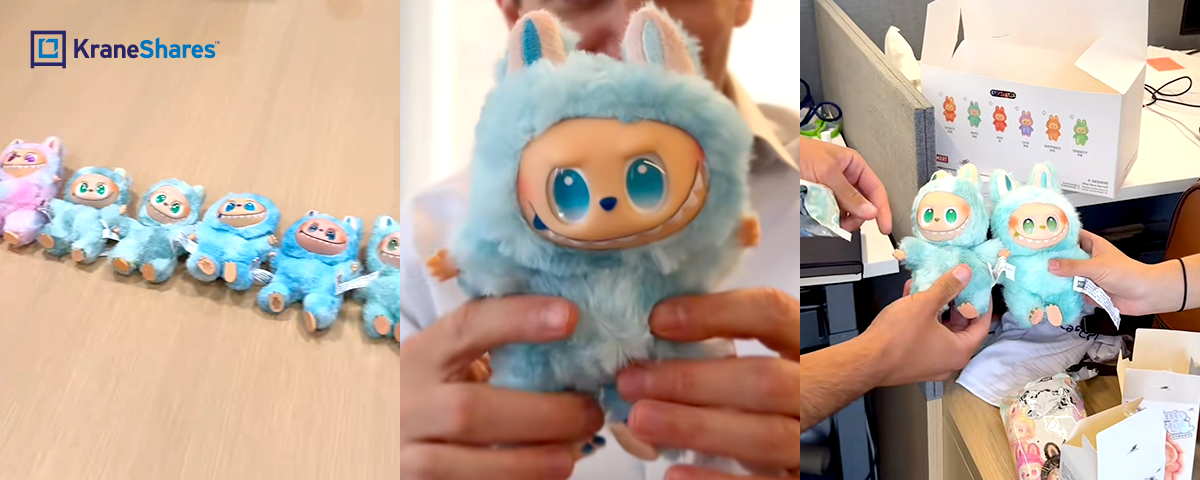
Labubus: How Pop Mart’s Newest Craze Reflects Chinese Cultural Influence in the U.S.
By Ilana Feder
Chinese culture has influenced popular consumer trends for years. Now, a Chinese designer toy collectible has taken the world by storm. Pop Mart, a Chinese company known for selling artistic collectible toys in blind-boxes, continues to prosper thanks to its furry little friends: Labubus. The growing debate on whether Labubus are adorable or terrifying won’t hinder Pop Mart’s overwhelming success, especially here in the U.S. The KraneShares CSI China Internet ETF (Ticker: KWEB) has secured a front row seat to the Pop Mart action as Labubus are sold through two of KWEB’s top holdings: Alibaba Group Holding Ltd. and JD.com Inc. Year-to-date Pop Mart stock is up 186.79%. So, what is it about Labubus that has allowed China to further drive the global culture?
The creatures were first introduced in 2015 by Hong Kong-born artist Kasing Lung. Their design was based on Lung’s illustrated book series called The Monsters. While Labubu fans have been around for a decade, the sensation didn’t really take off until Lung made the collaboration with Pop Mart in 2019. Labubus are small, elf-like plush toys that appear mischievous, yet cute. Their faces are made up of sharp-teeth smiles, big eyes, and blushed cheeks. Aside from their compelling features, Pop Mart’s strategic packaging has played a major role in the dolls’ success.
Pop Mart was founded in 2010 by millennial entrepreneur Wang Ning in Beijing, China. Originally starting off as a multi-brand retailer, Pop Mart eventually found its niche in 2014 when the company started collaborating with renowned artists and illustrators and primarily selling toys in “blind-boxs.” Blind-boxes offer customers the thrill of purchasing a figurine without knowing which design is inside. Each blind-box contains a toy from a specific collection, motivating customers to want to complete a full-set. According to Time, China’s designer toy industry is expected to reach US $15 billion in retail sales in 2026, more than a 1500% increase from 2015.1 The blind-box craze has become so large that the Chinese government has banned the selling of blind-boxes to children under the age of eight.2 Pop Mart has expressed that although they’re selling toys, their target market is actually not children. Rather, Pop Mart wants to cater to young adults wanting to fulfill collections and purchase thrilling experiences. For Labubus specifically, the chances of pulling a “secret”, or rare, Labubu are 1 in 72. Quite similar to gambling, Pop Mart’s blind-boxes keep customers coming back for more, motivated by the chances of finding that rare collectible.
Lababus’ appearance isn’t the only aspect of the furry figurine that has sparked controversy. Labubus are seen by many as a luxury fashion symbol. Recent trends have showcased Labubus being used as bag charms on high-end bags such as Hermes’ Birkins and bags from Louis Vuitton and Chanel. Celebrities and influencers, like Blackpink’s Lisa, Rihanna, Alix Earl, and James Charles, have been spotted rocking a Labubu bag charm. Some big-time Labubu fans even take it one step further by dressing up their Labubus to match their outfits. As seen on Etsy, there is a huge market for Labubu-sized clothing and accessories, including mini designer items like a Prada hat or a “Lirkin” (Labubu Birkin). Labubus have been transformed from plush toys to fashion icons.
Similarly to many recent trends, Labubus popularity has skyrocketed with the help of platforms like TikTok, YouTube, Xiaohongsu (RedNote), and Instagram. Labubu unboxing videos allow viewers to virtually share the excitement of finding out which Labubu lies inside the blind-box. Influencers gain likes while viewers are inspired to go hunt down a Labubu to keep for themselves.
Pop Mart has over 500 stores in 30+ countries and regions, including 22 stores in the U.S. Pop Mart’s New York presence started with its first location in the World Trade Center and continues to expand as they recently opened in Flushing, Queens in December, 2024. Located in the Tangram Mall, this Pop Mart is a prime example of the emergence of Chinese culture here in the U.S. During its grand opening, Larry Lu, President of Pop Mart North America, shared, “For the opening, we partnered with Haidilao Hot Pot to create a memorable experience that celebrates our shared cultural roots."3 Flushing, often referred to as the “Chinese Manhattan,” is known for its thriving Chinese population. Now, people of all backgrounds are rushing to get their hands on a Labubu. Currently, Labubus are sold-out at Pop Mart brick-and-mortar locations; however, fans know to keep an eye on Pop Mart’s website as Labubus are restocked first online every Thursday at 10:00PM ET. Popmart is the 6th most downloaded free app in the US Apple App Store.4 It’s joined the ranks of ByteDance’s TikTok & Lemon8, RedNote, DeepSeek, Temu and Shein as a Chinese app breaking into the U.S. top 10. With the addition of Pop Mart and the growing demand for collectible toys like Labubus, Chinese influences will continue to drive consumer behaviors in the U.S.
For an even more interactive experience, Labubu fanatics can now take themselves to POPLAND Beijing, also known as Pop Mart City Park. This Pop Mart-themed theme park includes zones filled with life-sized versions of Pop Mart’s beloved toy collections, including Labubu Adventure Forest.5 Within the Labubu Adventure Forest, theme-park goers can immerse themselves in Labubus’ natural environment and walk among them. From POPLAND alone, it’s clear that Labubu fans are going to great lengths to “meet” their prized posessions.
KWEB, KraneShares’ China Internet ETF, provides investors with exposure to the rapid growth of Pop Mart and the Labubu craze as two of KWEB’s top holdings, Alibaba and JD, sell the trend-setting dolls. On June 18, 2025, a special livestream for Pop Mart was run by AliExpress, Alibaba’s online global retail platform, with the goal of promoting Labubu sales. This goal was exceeded as Labubus were sold out almost immediately. Within the same week, Pop Mart launched the first global online pre-sale of Labubu 3.0. Sales on Pop Mart’s JD flagship store exceeded 300,000 units. According to the Economic Observer Online's report, the projected sales revenue is expected to exceed 500 million yuan.6 Additionally, BiliBili, another one of KWEB’s top holdings, has a huge Labubu presence. BiliBili is a Chinese online video sharing website similar to YouTube. Type in “Labubu,” into the search bar and watch as hundreds of videos showcasing Labubu unboxings and Labubu animations pop up.
KraneShares will remain watching as Pop Mart flourishes. While the future of the Labubu trend remains uncertain, Chinese cultural influences continue to gain visibility in the U.S. and other global markets.
High short-term performance from a limited number of the fund’s holdings is unusual, and investors should not expect such performance to be continued over the long term. Past performance does not guarantee future results.
For KWEB standard performance, top 10 holdings, risks, and other fund information, please click here.
Citations:
- Klein, Christina. “Inside Pop Mart’s Global Toy Takeover.” Time, 27 Mar. 2025, time.com/7271656/popmart-china-blindbox-labubu-designer-toys-genz-luxury-industry-revenue/.
- Meng, Ruixin. “China’s Warning on Blind‑Box Toys Sends Pop Mart Shares Sliding.” Yahoo Finance, 20 June 2025, finance.yahoo.com/news/china-warning-blind-box-toys-060257368.html.
- Tangram. “Pop Mart Opens in Queens.” Tangram, 7 Dec. 2024, tangramnyc.com/en/press/pop-mart-opens-in-queens/.
- Data from the Apple App Store as of 7/7/25.
- Lam, Julia. “POP LAND Beijing Theme‑Park Guide.” Klook, 30 May 2025, klook.com/blog/popland-beijing-theme-park-guide/.
- Zhao, Ying. “Chinese Customs Seize Multiple Batches of Counterfeit Pop Mart’s Popular ‘LABUBU’ Items.” Global Times, 11 June 2025, www.globaltimes.cn/page/202506/1336497.shtml.
KWEB Holdings Mentioned as of 7/23/25:
- ALIBABA GROUP: 8.81%
- JD.COM: 5.70%
- BILIBILI: 3.74










